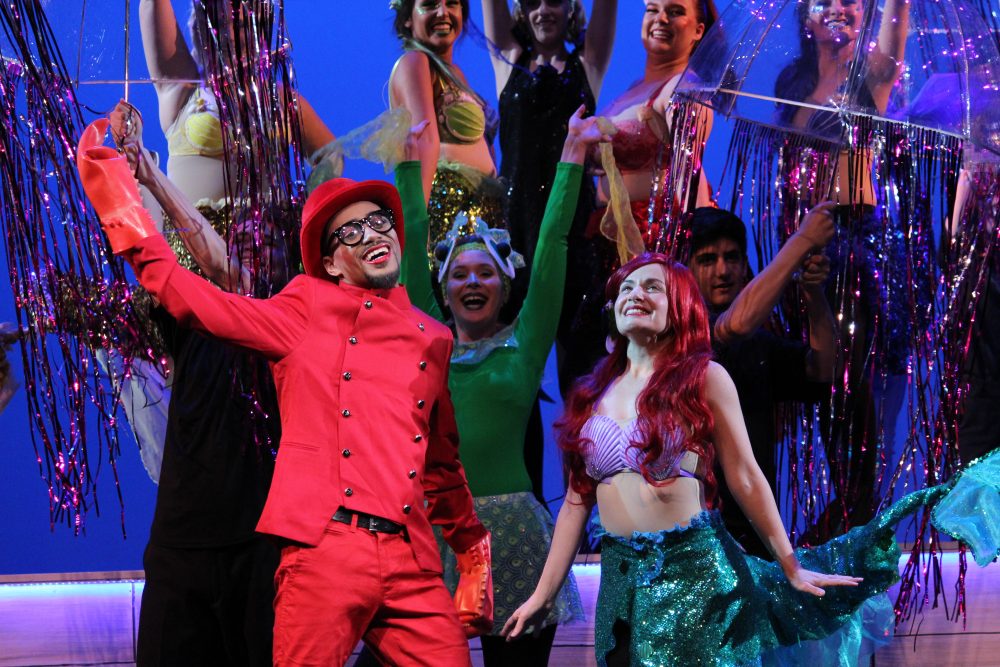
If you didn’t get a chance to see CenterStage’s production of Disney’s “The Little Mermaid,” you missed out on a phenomenal performance that transported audience members under the sea.
The entire first act was mesmerizing as favorite tunes from the Disney animated classic came to life on stage, most notably Ariel’s notorious solo “Part of Your World” and the spectacular ensemble performance of “Under the Sea,” wherein various sea creatures swam off the stage and surrounded the crowd. My personal favorite were the jellyfish, whose tentacles sparkled with glittery streamers attached to clear dome umbrellas—genius costuming in my opinion. Certainly, one of the highlights of the show, the number showcased the talent of all involved in the production as nearly the entire cast sang and danced their hearts out on the beautifully decorated deep-sea set. I have to give a special kudos to the costume designer who made each fish, crab and starfish a unique creation.
The “Under the Sea” showstopper was so grand and I half expected it to lead to intermission, but the show went on and it was everyone’s favorite villainous sea witch Ursula, portrayed by CenterStage newcomer Kari Mason, who stole the show with “Poor Unfortunate Souls.” Mason encompassed the manipulative Disney villain and, thanks to another great feat of costume design and makeup, looked 100 percent the part. And while the song was the kicker and served as the dramatic climax leading into the interlude, Ursula’s speaking parts were something to behold as well, with Mason incorporating the perfectly cunning and evil infliction to her voice, even including a snickering laugh that hinted at the witches less than honorable intentions toward her innocent unsuspecting niece, who took Ursula’s bait hook line and sinker.
I also have to hand it to the actors portraying Flotsam and Jetsam, Ursula’s often forgotten sidekicks, who made the eels seem as absent minded yet dutiful to their master and sneaky in a most electric way.
While the villain performances stood out, the leads Ariel (Lorraine Christiansen) and Eric (Caleb Harbin) shined as well. In the very first scene, Harbin’s Eric started the show with a strong tenor solo while aboard his trusty ship, which would later be sunk to ruin though Ariel would save his life. In the second act, Caleb’s role increased as he interacted with the mute Ariel and struggled with his developing feelings for her despite the fact she didn’t have the soprano voice he was searching for.
Using facial and bodily expressions, Christiansen was able to deliver a solid performance during those silent scenes, but it was when she was singing that Christiansen’s Ariel shined most and thankfully the play’s plot found opportunities for her in the second half to sing without betraying character—it’s how the audience knew what Ariel was thinking.
My favorite part of Act 2 was a song written specifically for the stage production called “If Only,” a quartet featuring Ariel, Eric, Sebastian and King Triton. All four actors nailed their parts and it was the most enjoyable scene in second half of the show.
My only qualms with the show had nothing to do with the stellar performance provided by CenterStage, but with some of the plot changes that deviate from the Disney film in Act 2. Obviously, I expected plenty of new material to make the production longer than the 90-minute cartoon and unlike the cartoon, I understood a live production cannot do some of the “movie magic” elements, like transforming Ursula into the beautiful Vanessa who tries to seduce Eric in the Disney movie. However, I would have liked to see more of Ursula with a more devious plan—perhaps she could have had daughter, for instance, who she wanted to see marry the prince instead of Ariel or some other way to use Ariel’s voice to her advantage.
Most disappointingly, I really would have loved to see a larger battle between Ursula and King Triton, especially after it was revealed that Ursula was the one responsible for his wife’s death and not humans. The way Ariel was able to snatch the enchanted shell and destroy it without much of a fight made the build up to the confrontation fall flat. Much of the second act provided filler with minor characters getting their own musical numbers, including Scuttle the seagull in a number that was particularly silly called “Positoovity” in which he encouraged Ariel to walk. In the movie, the silly seagull is legitimized in the end by being the one to grab Ursula’s shell unexpectedly. Though I don’t mind taking Scuttle out of the ending, I think giving him his own song while lessening his bravery role at the end is contradictory. Of course, these issues with the story itself have nothing to do with the extraordinary performance provided by CenterStage.
Though I would have liked to see a stronger ending storyline, the production was immensely entertaining and the musical numbers were flawless. Overall, I give CenterStage a 10/10 for a fun rendition of “The Little Mermaid.”









